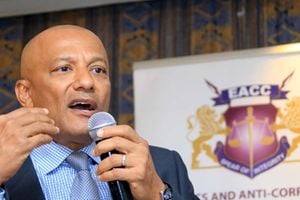
Bishop David Oginde during the launch of the EACC Strategic Plan aimed at aiding the fight against corruption at KICC on September 26, 2023.
Some Members of Parliament are reading mischief in the proposal to replace Ethics and Anti-Corruption Commission (EACC) chairperson Bishop David Oginde before the expiry of his term.
The legislators say that this would jeopardise the high-level investigations the commission is currently conducting.
The MPs’ fears are shared by the EACC in a memorandum before the House, which is questioning the proposal in the EACC (Amendment) Bill 2024 currently before the House.
The Bill, a product of the National Dialogue Committee (Nadco), whose report was adopted by Parliament in February 2024, seeks to limit the qualification of the commission’s chairperson to a person qualified to be a judge of the High Court in proposed changes to section 5 (1) of the EACC Act.
The Bill as originally published had saved the legitimate expectations of the current office holder “where the change in qualification for the appointment shall not apply to the chairperson appointed before the commencement of the Act.”
However, the Justice and Legal Affairs Committee (JLAC) of the National Assembly, upon consideration of the Bill, has proposed that it be amended so that its application takes effect immediately after it becomes law, in a report to the House.
“There is a need to ensure that after the commencement of the Act, the commission benefits immediately from a chairperson, who is a person qualified to be a judge of the High Court,” the report of the committee chaired by Tharaka MP George Murugara proposes.
The Bill is in the name of the House leader of Majority Kimani Ichung’wah and his former minority counterpart Opiyo Wandayi before he was appointed to the cabinet.
But legislators Anthony Kibagendi (Kitutu Chache South) and Senator Daniel Maanzo, have faulted the proposal, warning that it will derail the EACC investigative powers if it takes long to recruit the chairperson after removing the current chairperson.
“It is simple. If you want to derail EACC, just remove the current chairperson and at the time the commission is recruiting a CEO and procrastinating on the recruitment of his successor,” said Mr Kibagendi.
The legislator added: “We have seen the same happen with the electoral commission and we cannot afford to keep quiet as things are about to wreck what EACC is doing.”
The Bill sailed through the debate stage two weeks ago and is set for the committee stage where the real lawmaking happens.
For a file to be submitted to the Director of Public Prosecutions (DPP) for action, it must have the signature of the EACC chairman and the CEO, meaning that in the absence of any of the two, no files can be submitted to the DPP.
Makueni Senator Daniel Maanzo noted that Bishop Oginde is being targeted because of the firm position he has taken in the fight against corruption.
“They just want to sack the current chairperson because he is incorruptible and bring a person who will sing to their tune. This is mischievous,” said Mr Maanzo.
With the EACC CEO Twalib Mbarak on terminal leave pending his retirement after serving a six-year non-renewable term, the proposal to remove the chair will derail “not only the submission of graft files to the DPP for action but also derail the scheduled interviews for the commission CEO position.”
Already 14 people have been shortlisted for the CEO interviews by the commission from November 19, 2024, to November 21, 2024.
Bishop Oginde, 64, formerly the presiding Bishop of the Christ is the Answer Ministries (CITAM), was appointed on May 2, 2023, by President William Ruto to be the EACC chairperson for a fixed term of six years following the retirement of Archbishop Eliud Wabukala.
Mr Mbarak, in his submission to Parliament, noted that the proposed amendment seeks to limit the leadership of the commission.
“The commission, having carefully considered the proposed amendment, opposes the Bill,” says Mr Mbarak in a submission to the House. “Based on our experience, there is no added advantage of having a lawyer over the other professions,” he adds.
The former CITAM Bishop was nominated by the president on March 11, 2023, on the recommendations of the Public Service Commission (PSC), beating about 50 other hopefuls.
During his vetting by JLAC, Bishop Oginde was put to task for saying that “Kenya is a corrupt country” but he fought on to have his job.
Mr Oginde told the committee that to deal with corruption in the country, cases involving the high and mighty should be treated like election petitions which have a 6-month timeline for resolution.
“When we see seriousness at the top, people from the low levels will also shun corruption as they will see we are serious. I propose that we come up with legislation so that we can deal with these cases within three months,” said Bishop Oginde in what may have come to haunt him.
“I would like to implore the Judiciary and the Law Society of Kenya that if we love this country, the way we handle corruption cases should be focused on eradicating it. Some people are let go on flimsy grounds or technicalities and hence public opinion is that justice is not served,” he said.
Currently, the term of service of the EACC chairperson is on a part-time basis with functions related to strategy and policy “not operational in nature to warrant a legal mind.”
Mr Mbarak notes that the proposed law does not make sense considering that the commission has a fully-fledged legal services directorate with some of its officers holding qualifications of a judge of a superior court.
The functions of the legal directorate include reviewing evidence in the course of investigation to ascertain it meets the legal threshold and advising the commission on any legal issue before it.
EACC also notes that restricting the role to the legal profession amounts to excluding candidates from other professions or backgrounds which could result in a lack of diverse competencies and expertise, which may limit diversity in the leadership of the commission.
The commission warns that while the legal profession may possess strong legal expertise, it may lack skills and experience in leadership and other areas relevant to anti-corruption work like investigation techniques, financial analysis, corruption prevention and advocacy.
The Bill, if passed in its current form, will also likely portend missed opportunities for innovation according to the commission.
“Candidates from non-legal backgrounds may bring fresh ideas, innovative approaches and diverse skill sets to the role of the chairperson. Restricting the position to the legal profession could result in missed opportunities for innovation and improvement within the commission.”
The EACC Act lists a law degree from a university recognized in Kenya as one of the professions from which a chairperson may be appointed.
Leadership and Integrity
The objective of the Bill, according to the commission, may well be realised as an issue of selection as opposed to an amendment of the said provision.
Other than the law degree qualification, a person is qualified for appointment as EACC chairperson if the person meets the requirements of chapter six of the constitution in terms of leadership and Integrity and has had “a distinguished career in their respective field.”
A person is also considered qualified for the job if the individual has knowledge and experience of not less than 15 years in any of the fields of ethics and governance, law, public administration, leadership, economics, social studies, audit, accounting, fraud investigation, public relations and media or religious studies or philosophy.
The EACC chairperson has previously been occupied by various professionals including a lawyer qualified to hold office of a judge of the High Court.
For instance, Mr Mumo Matemu, a lawyer, has previously chaired the commission.
Currently, the commission is chaired by Mr Oginde, an architect and a retired Bishop, who succeeded Archbishop (Rtd) Wabukala.
Previously, under the old constitution, Mr Arron Ringera was the director of the anti-graft body assisted by Dr Smokin Wanjala, the current Supreme Court judge among others.
When Justice (Rtd) Ringera left, he was succeeded by Dr Patrick Lumumba, a law scholar. At the time, the state agency was called the Kenya Anti-Corruption Commission (KACC).
It was overseen by an advisory board that would later oversee its transition from KACC to EACC following a review of the law.
The advisory board was chaired by city lawyer Ahmednassir Abdullahi for five years from 2003 with Ms Fatuma Sichale, the current judge of the Court of Appeal, as his vice-chairperson.
In 2009 city lawyer Okong’o Omogeni, the current Nyamira Senator took over from Mr Abdullahi and was succeeded by Dr Tom Ojienda, a professor of law who is the current Kisumu Senator.










